'At long last': South Bend Symphony shines a light on music, influence of Black composers
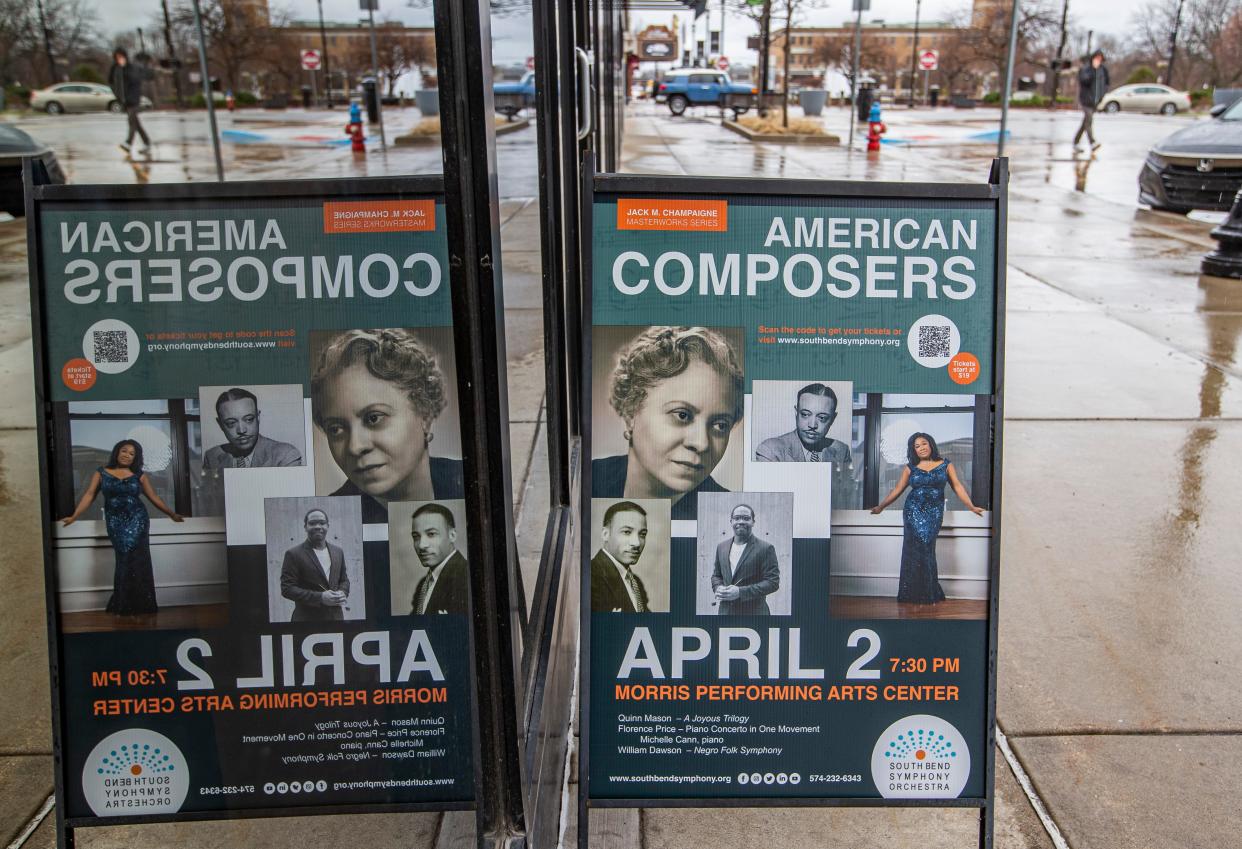
In a 2019 article published in The American Scholar, cultural historian Joseph Horowitz poses the question: Was Dvořák naïve?
He’s referring to the Czech composer’s 1893 statement to the New York Herald that “the future music of this country must be founded upon what are called negro melodies. … In (them) I discover all that is needed for a great and noble school of music.”
Michelle Cann, a Black pianist who performs April 2 with the South Bend Symphony Orchestra, doesn't think Dvořák was naïve.
“Dvořák called it from what he could see and hear,” she says by phone from Philadelphia, where she lives. “At the end of the day, he heard the roots of jazz and how jazz branched out into other things — folk songs and spirituals. He said, ‘This is what’s unique.’”
Although it became the foundation for jazz, blues and other popular music genres and influenced composer George Gershwin two decades after Dvořák’s “prophecy,” Black music has largely been excluded from the concert hall.
But after the murder of George Floyd by a Minneapolis police officer in May 2020 and the reckoning with the United States’ racist past and present that his death caused, the SBSO decided to address the historic neglect American orchestras have shown toward Black composers and performers.
This month, the orchestra and the St. Joseph County Public Library joined forces to hold a three-week book symposium devoted to Horowitz’s “Dvořák’s Prophecy and the Vexed Fate of Black Classical Music,” with the final meeting scheduled for March 30.
After that, the SBSO’s April 2 concert is the first in its 89-year history with a program composed entirely of works by Black composers: Quinn Mason’s “A Joyous Trilogy”; Florence Price’s Piano Concerto in One Movement, with Cann as the guest soloist; and William Levi Dawson’s “Negro Folk Symphony.”
The concert's program: ‘A Joyous Trilogy’: South Bend Symphony program featuring works by Black composers
Together, the book club and the concert mark the first public events to come out of the SBSO’s Equity, Diversity and Inclusion initiative that it launched after Floyd’s murder.
“We see the importance in that pretty much every American orchestra is stepping up and looking at their past of building their orchestras on white, dead European composers,” SBSO Music Director Alastair Willis says. "The explosion of EDI, it’s so important, and it’s so, ‘At long last.’”
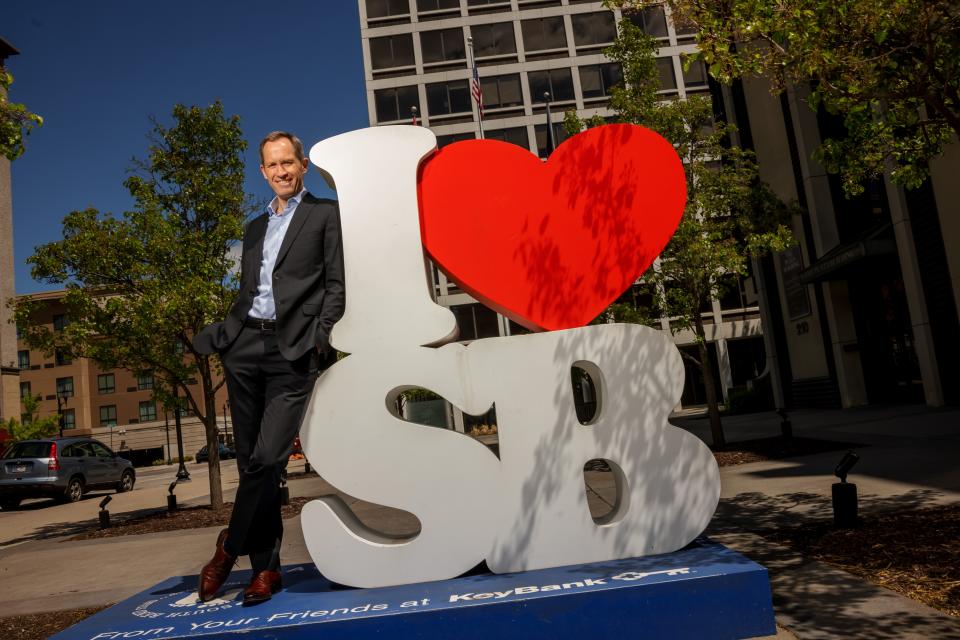
‘An indictment of American symphonies’
The SBSO’s Equity, Diversity and Inclusion statement begins, “The South Bend Symphony Orchestra acknowledges America’s legacy of systemic racism in society and, in particular, how that legacy has permeated American orchestras.”
“We created a statement that was an indictment of American symphonies,” EDI Chair and Black composer and educator Marvin V. Curtis says. “And it was a true statement. … So much of our culture has been erased.”
Willis is just as direct.
“Essentially, coming back to our EDI committee, what’s clear to everybody in the classical music world is that classical music is rife with racism,” the SBSO’s music director says. “How can we address this?”
That doesn’t mean the SBSO will “program something by a composer because it ticks a box,” Willis says.
“What it comes down to is the quality of music,” he says. “There is some fantastic music out there by underrepresented composers who are finally getting attention.”
Cann and others stress that it doesn’t mean shunning other cultures, nor does it mean having a “special moment” and then going back to business as usual.
“I would love an actual future where Black history and Black excellence were celebrated alongside all American culture,” Cann says. “If we start celebrating in an equitable way, then we won’t need these special moments of, ‘Hey, look! A Black composer!’”
‘Eager to hear it again and yet again’
William Grant Still’s “Afro-American Symphony,” Price’s Symphony in E minor and Dawson’s “Negro Folk Symphony” all premiered between 1931 and 1934 in performances by leading American orchestras.
All three bear influences either from the Romantic era or contemporary classical music of their period, while also incorporating Black spirituals, dances and blues into their scores.
Contemporaneous reviews — “One is eager to hear it again and yet again,” Pitts Sanborn wrote in the New York World-Tribune about Dawson’s symphony — make it sound as if all three works would soon become as commonplace on the American concert stage as works by, well, Dvořák.
But that didn’t happen.
Although Still’s symphony became the most performed American symphony between 1931 and 1950, Price’s and Dawson’s symphonies quickly faded into obscurity.
“My research has shown that when these pieces were played, the demand was great, but there weren’t many editions,” the SBSO’s Willis says. “There weren’t many scores, so the infrastructure didn’t support it.”
Renovations on the way: A parking garage and new seats planned for Morris Performing Arts Center in South Bend
Cann looks to the times for some explanation of why Price’s and Dawson’s works didn’t become commonplace after their premieres in the early 1930s.
“We were just getting to a time in New York City where Black artists were just starting to play for white audiences,” she says. “If you look at it like that, I’m not surprised that even if a critic said this is great, they couldn’t get it played much.”
In addition, minstrel shows and blackface created an image of Black people as lazy, ignorant, criminal or cowardly from the 1830s to the 1930s.
“They were caricatures,” Curtis says. “How dare we do serious stuff? We were supposed to be caricatures. This is about history, and we are not taught the whole history in this country.”
Supporters and some success
Black composers and performers had some early supporters.
Jeannette Thurber, for instance, founded the National Conservatory of Music of America in 1885 with a charter that explicitly barred discrimination at the school.
Like Price and Dawson, Americans such as Francis Johnson (1792-1844), William Grant Still (1895-1978), Margaret Bonds (1913-1972), Harry T. Burleigh (1866-1949) and Nathaniel Dett (1882-1943) enjoyed some success as composers. George Walker (1922-2018) became the first African American to win the Pulitzer Prize for Music, in 1996 for his “Lilacs.”
But their success was limited, with performances often given at music societies and in churches rather than concert halls.
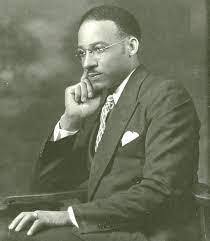
Dawson (1899-1990), for instance, served as the director of Alabama’s Tuskegee Institute Choir, which toured the world and became known for his arrangements of Black spirituals. But he didn’t write another symphony after “Negro Folk Symphony” disappeared.
When the Chicago Symphony Orchestra premiered Price’s Symphony No. 1 on June 15, 1933, she became the first African American woman to have a full-length work performed by a major orchestra.
When Cann performed Price’s piano concerto with The Philadelphia Orchestra in January 2021, it was only the second time in the orchestra’s history since its founding in 1900 that it had programmed a work by Price (1887-1953).
The first was in September 2020.
“I guarantee you she reached out to them and that they knew about her, but they didn’t play anything,” Cann says about The Philadelphia Orchestra, known as one of the “Big Five” American orchestras. “That kind of exclusion is not unique.”
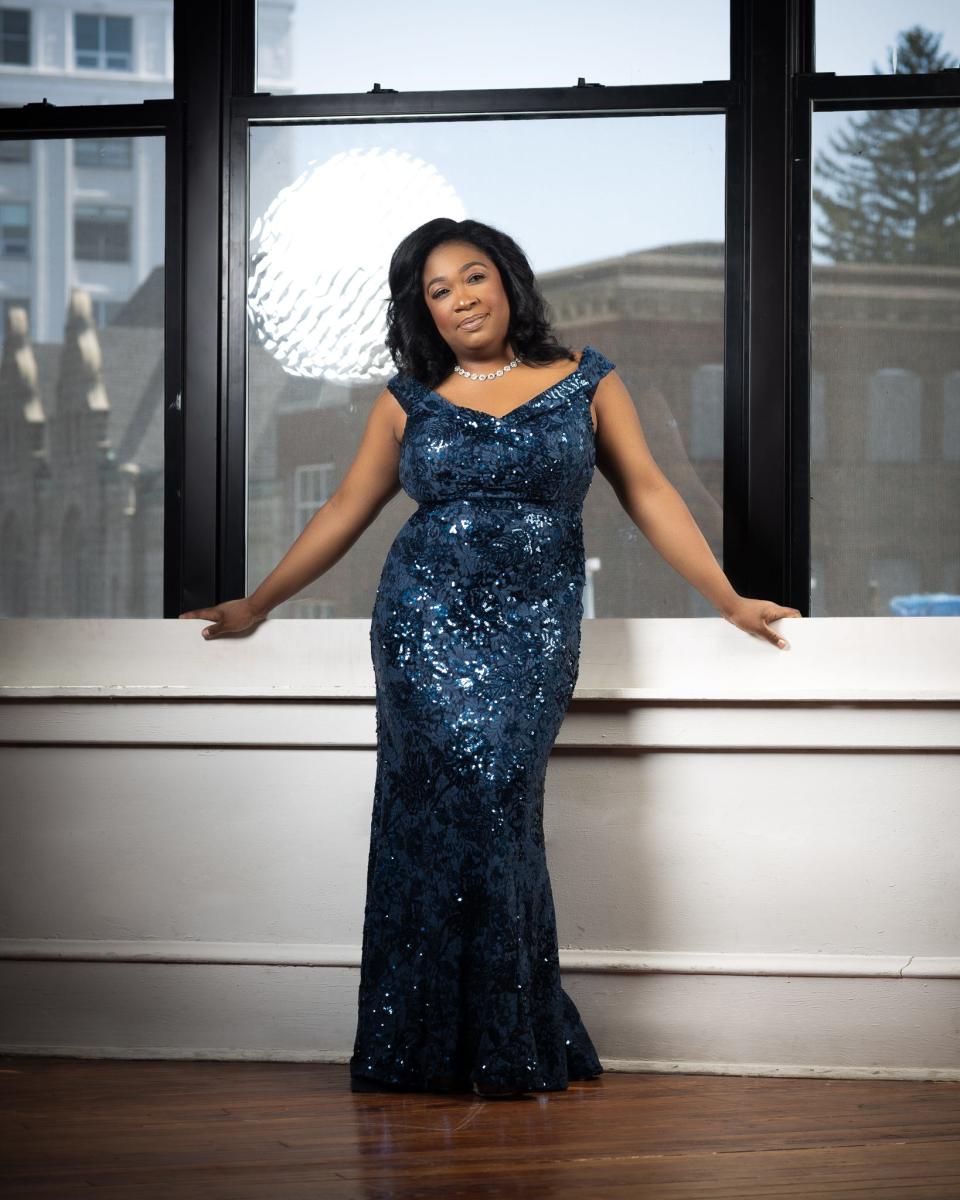
‘They’re excited to play it’
When Cann was a student at the Cleveland Institute of Music (classes of 2009 and 2010) and the Curtis Institute of Music (class of 2013), she says, her professors “maybe” mentioned Florence Price, but it “was in the context of women composers,” not Black composers.
Curtis, the emeritus dean of the Raclin School of the Arts at Indiana University South Bend and a composer, received an even harsher evaluation of Black composers’ contributions: “I had a teacher who said there was no Black music to study and that’s why he didn’t teach it.”
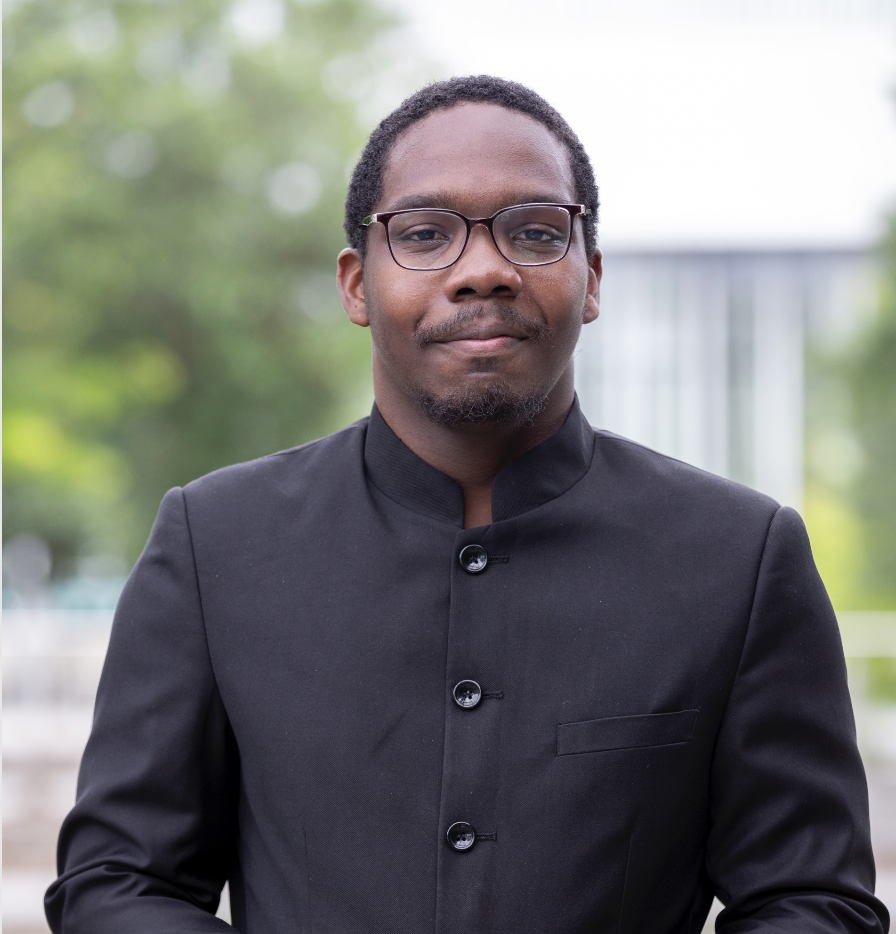
Now that is beginning to change.
“Especially after two years ago, now it seems like most of my music-educator friends are making an effort to include the music of Florence Price and William Grant Still in their curriculum,” Mason says by phone from Dallas, where he lives.
Philadelphia's Curtis Institute hired Cann in November 2020 to teach piano, and in her first semester, she offered a class on Black composers to her piano students. They learned about their lives and their music, and the pianists had to learn some of the works discussed in the class. Two of them have since added works from the class to their repertoires.
“Here’s my point: It was a mini course and two of them are already playing them,” she says. “As soon as you expose this music to musicians, they want to play it. They’re excited to play it. It’s not like I’m pulling their legs to play it.”
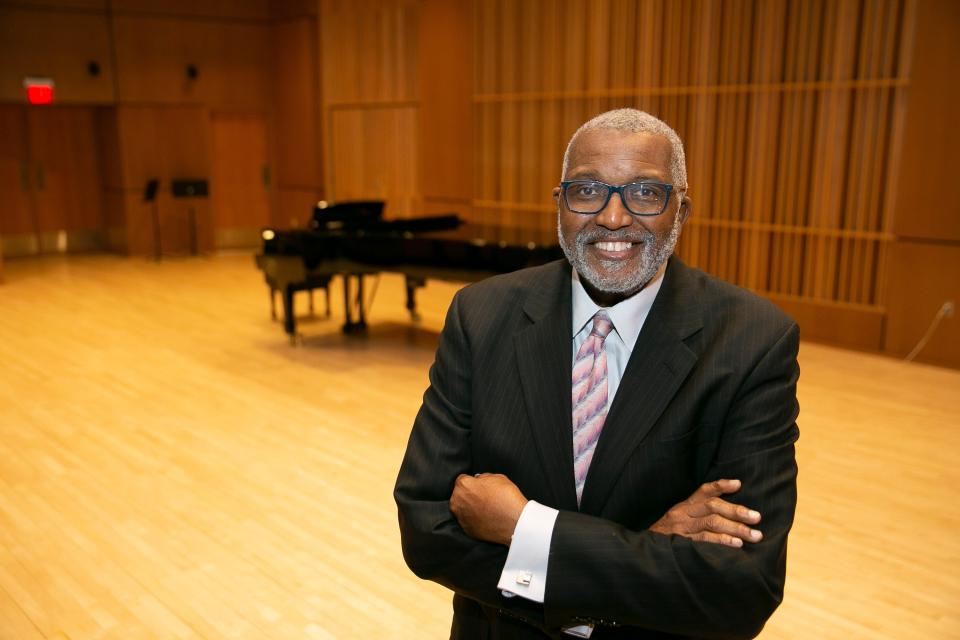
As a composer, Curtis says, he hasn’t face some of the difficulties other Black composers have in getting their music performed.
Until recently, however, he wrote choral music, not instrumental music.
Even when his “The City on the Hill” was performed at Bill Clinton’s 1993 inauguration, he had to counter a stereotype from those that programmed it.
“The assumption was that it was gospel,” Curtis says. “I don’t write gospel. I wrote an anthem. … The reality is that I write in the classical style.”
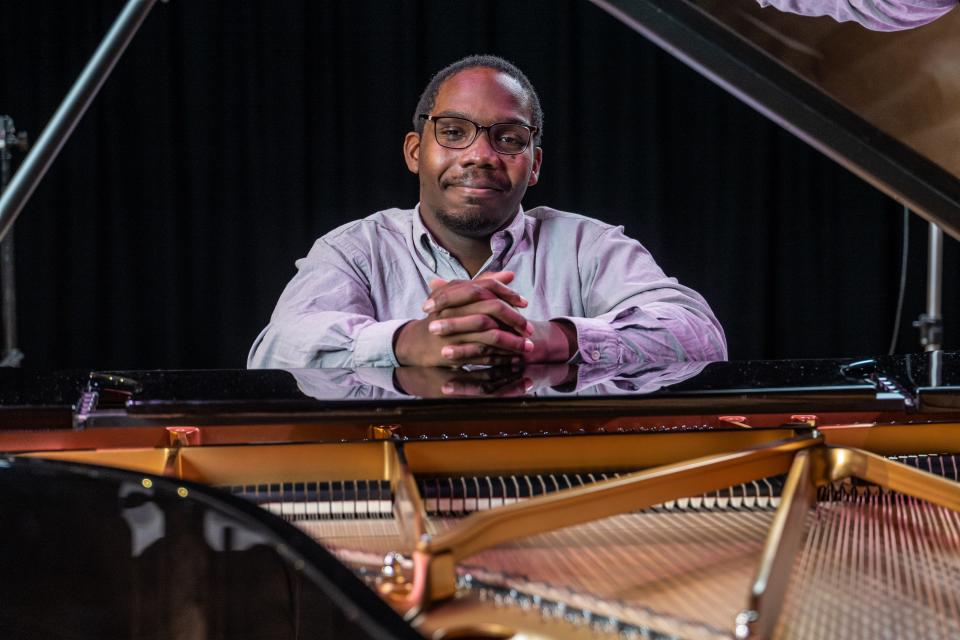
Mason, who turned 26 on March 23, has had remarkable success for a contemporary composer, especially one his age.
“Even some well-known symphony composers have trouble getting their symphonies programmed,” he says, “so they don’t call them symphonies. … Orchestras are skeptical, especially when it comes to contemporary composers.”
Mason thinks part of his success is because he writes “music I like to hear,” even as he lists previously controversial composers such as Igor Stravinsky and John Adams as major influences.
Willis, who already has performed two of Mason’s works with the SBSO in the 2019 and 2021 seasons, says the composer’s “been called the rising superstar in the classical world.”
At least three orchestras besides the SBSO, for example, have “A Joyous Trilogy” scheduled for this season, and the Houston Ballet is creating a new dance piece choreographed to its music.
Mason’s hometown ensemble, the Dallas Symphony Orchestra, commissioned his “Emergence: My Inner City Rhapsody” and premiered it in 2019, as well as his “Reflections on a Memorial."
Seattle’s Harmonia Orchestra and Chorus also has commissioned works by him, including “A Joyous Trilogy” and a symphony he’s currently writing.
“It’s changing for the better,” Mason says. “I’m starting to see organizations make an effort to include under-represented voices on their programs.”
‘This is not a one-off’
With works by Mason, Price and Dawson on the program, Curtis says, the April 2 concert is a testament to the power of the music.
Price and Dawson’s works both premiered in 1934, and with the inclusion of Mason’s work, the concert both recognizes two undeservedly long-neglected works and pushes classical music forward with Mason’s infectious concert-opener.
“They made this concert and called it ‘American Composers,’ not ‘American Black Composers,’ Curtis says. “That’s a statement by itself.”
Mixing music and current events: South Bend Symphony focuses on climate change with 'Terra Nostra'
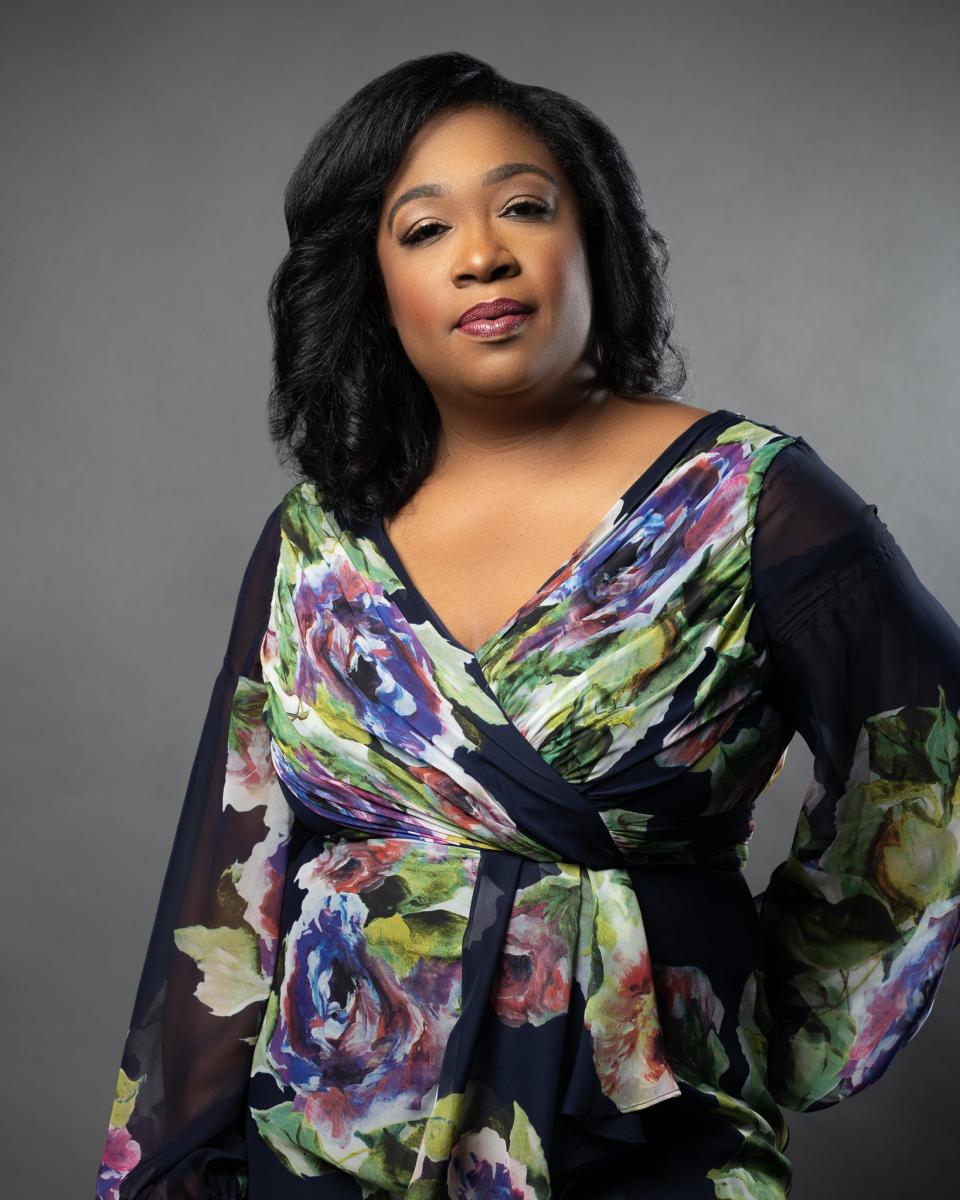
Change, Cann says, doesn’t happen without “motivation on some level to make a change.”
“What’s sad is that the motivation that shook the classical world — and the whole world — was the death of George Floyd,” she says. "I’m happy to see that a lot of them are questioning themselves. But then the question is, what does the future hold?”
It’s not enough, Cann says, for the music director to commit to such change. It must be embraced by the entire organization, including the musicians and the board of directors.
At the SBSO, the number of African American board members has increased from one, Curtis, to a total of three this year. SBSO Executive Director Justus Zimmer says he expects that number to continue to grow.
“It’s a commitment that will outlast the current music director,” Willis says. “We’ve committed to programming a certain amount of African American and/or underrepresented composers in our seasons. This is not a one-off.”
In concert
• Who: The South Bend Symphony Orchestra with guest soloist Michelle Cann
• Where: Morris Performing Arts Center, 211 N. Michigan St., South Bend
• When: 7:30 p.m. April 2
• Pre-concert talk: Maestro Alastair Willis and composer Quinn Mason conduct an in-person pre-concert talk at 6:30 p.m. April 2 at the Morris.
COVID protocols: Regardless of vaccination status, all patrons are required to wear a mask during performances.
• Cost: $86-$10
• For more information: Call 574-235-9190 or visit morriscenter.org.
Book symposium
Marvin Curtis leads a discussion of Joseph Horowitz’s “Dvořák’s Prophecy and the Vexed Fate of Black Classical Music” at 7 p.m. March 30 at the St. Joseph County Public Library, 304 S. Main St., South Bend.
This article originally appeared on South Bend Tribune: South Bend Symphony highlights Diversity Inclusion of Black composers

